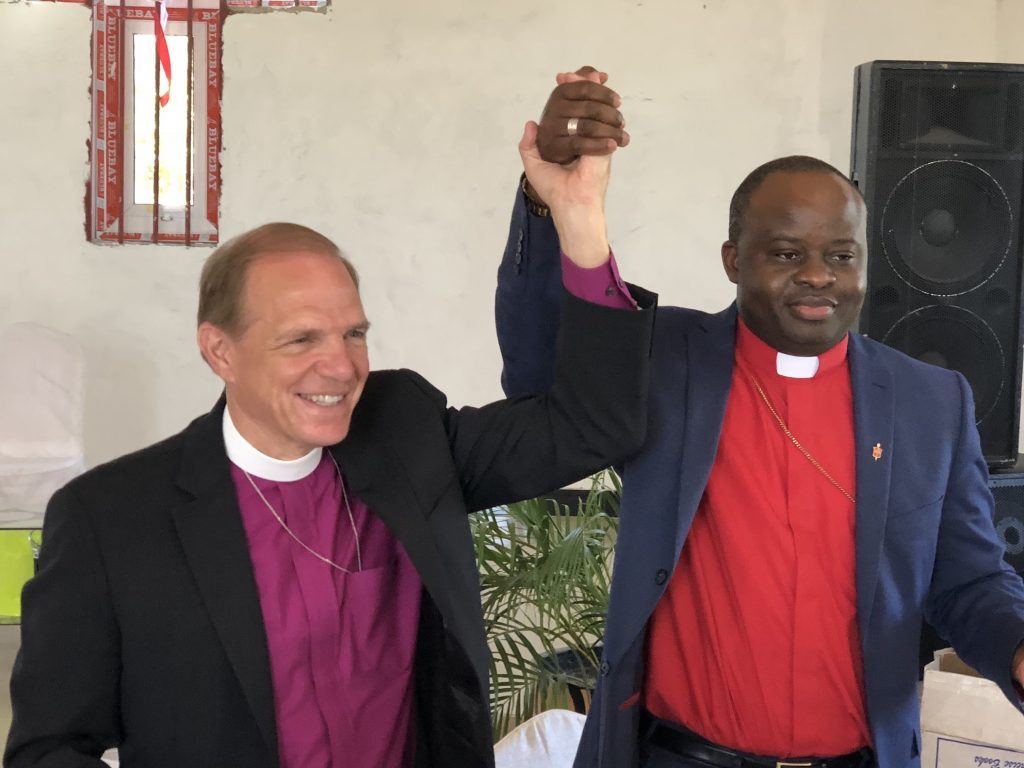Mwanza, Tanzania
The five-day Tanzania Local Pastors’ School, led by a team from Greater New Jersey, included topics ranging from an overview of the Bible to leading the congregation toward vitality, and from stewardship to the Trinity. Bishop Mande Muyombo of the North Katanga Episcopal Area led a session on the Global Church and invited Bishop John Schol to talk about what is occurring in the U.S. following the February General Conference Special Session.
“Connectionalism makes the United Methodist Church unique,” said Bishop Muyombo, “John Wesley meant the annual conference to be a place of relationship. The global relationship of our church calls us to be together and at the same time recognize our diversity.” Bishop Muyombo recognized that the church is struggling because of different understandings of how to be in ministry with the LGBTQ community.
Bishop Schol emphasized that our connection builds relationships and increases our capacity for mission, but that our relationship and mission was in danger.
“Sometimes what is voted in General Conference does not give those of us in the United States room to adapt,” he continued, “there are unique differences around the world.”
Using the example of electrical connections in different countries, Bishop Schol demonstrated how we need to adapt ministry to different contexts. “In Africa, we use this electrical cord,” said
Bishop Schol as he held up a three-pronged plug specifically designed to receive electricity in Tanzania but would not work in the U.S. “In the United States we use this kind of electrical cord,” he continued, holding up a plug standard for use in the U.S. “Both cords give us electricity, however if you try to force one plug out of context, you will burn out the plug and even the piece of equipment you want to use.”
Bishop Muyombo asked those who attended the Special Session of General Conference in St. Louis to share their experiences. One delegate shared that he did not understand the issues before going and got confused by the language while there. Two of the women delegates shared that they were happy to hear the progressives at the conference share that they will not give up on the church. One shared, “They will stay and fight because their families, their mothers and fathers and their grandparents are all a part of the church.”
Tanzanian delegates all shared that they believed United Methodists left unified about the outcome of General Conference and would continue as a unified church.
Bishop Schol tempered the understanding, “If there is not room created for different contexts by 2020, the church will most likely divide.”
To demonstrate the challenges in Greater New Jersey, Bishop Schol called on the pastors in attendance to share their experiences.
Rev. Ronell Howard, Christ UMC in Piscataway, shared that her congregation is divided and concerned. “We’ve talked about the issues facing the church and we’ve agreed on three priorities moving forward. The first is love, the second is unity and the third is understanding.”
Rev. Javier Barroso, from Fourth UMC in Millville shared that his church is more supportive of the present policy of the Book of Discipline and he recognizes there are different understandings.
Unable to restrain passionate tears, Rev. Heather Valosin explained that her church, Denville Community Church UMC is known as ‘The Church of the Open Door’ and that her congregation is proud to welcome all people. The decision at General Conference conflicts with their identity. It has caused great stress on Valosin because she agrees with her congregation, while loving the denomination. The African delegates were visibly moved by her witness. Bishop Muyombo called for prayer and delegates gathered around Valosin to pray for her, her church and the denomination.
Bishop Muyombo asked her to personally bring his message of hope and unity back to her congregation. “The church is open to everyone,” he declared.
Bishop Schol concluded the conversation asking the Tanzanians for their support for allowing differences in the U.S. and prayers to remain a global church. “My life is better by people thinking and practicing their faith in different ways,” he said.

